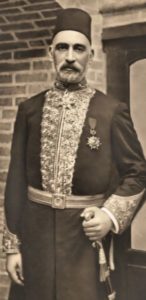Father of Iraq
 Sassoon Eskell (1860-1932) was born in Baghdad to a wealthy and illustrious Mizrachi Jewish family. At the time, some 40% of Baghdad’s population was Jewish. Eskell’s father was a rabbi, and at one point served as the chief rabbi of India’s large Baghdadi community. Eskell studied law and economics in Istanbul, London, and Vienna. He spoke nine languages fluently, and became the official translator (dragoman) for the Ottoman government in Baghdad. When the Ottomans drafted a constitution and established a new Turkish Parliament in 1908, Eskell was elected as Baghdad’s deputy representative. He also served as the under-secretary of state for trade and agriculture, and represented the Ottomans on multiple international delegations. At the end of World War I, the Ottoman Empire collapsed and Eskell was among the key figures that pushed for Iraqi independence. He was one of two Iraqi representatives that negotiated with Winston Churchill in creating the new state and choosing its first king. Eskell went on to be Iraq’s first finance minister, and continued in this role through the next five governments. He was the primary advisor to the Iraqi king and prime minister, and was described as “by far the ablest man” on Iraq’s governing council. Eskell was elected to the first Iraqi parliament in 1925, and continued to serve on it until his death. He is often referred to as the “Father of Iraqi Parliament”. Among his many significant achievements was making sure that Iraq’s oil was sold to the British for gold, not pounds sterling. While this was unusual at the time, the British pound soon lost most of its value and was no longer backed by gold. Sassoon thus ensured Iraq’s wealth was not diminished, and that it would continue to profit from its oil sales. These funds were critical in ensuring the success and viability of the nascent state. Eskell was also a major philanthropist and gave countless sums to charity. Much of his wealth went to the Jewish National Fund to support the re-establishment of Israel. The village of Kfar Yehezkel in Israel is named after him. Among his many other awards and honours, Eskell was knighted by King George V. Several years ago, the Iraqi government demolished his historic 100-year old home in a controversial move that made way for a new development.
Sassoon Eskell (1860-1932) was born in Baghdad to a wealthy and illustrious Mizrachi Jewish family. At the time, some 40% of Baghdad’s population was Jewish. Eskell’s father was a rabbi, and at one point served as the chief rabbi of India’s large Baghdadi community. Eskell studied law and economics in Istanbul, London, and Vienna. He spoke nine languages fluently, and became the official translator (dragoman) for the Ottoman government in Baghdad. When the Ottomans drafted a constitution and established a new Turkish Parliament in 1908, Eskell was elected as Baghdad’s deputy representative. He also served as the under-secretary of state for trade and agriculture, and represented the Ottomans on multiple international delegations. At the end of World War I, the Ottoman Empire collapsed and Eskell was among the key figures that pushed for Iraqi independence. He was one of two Iraqi representatives that negotiated with Winston Churchill in creating the new state and choosing its first king. Eskell went on to be Iraq’s first finance minister, and continued in this role through the next five governments. He was the primary advisor to the Iraqi king and prime minister, and was described as “by far the ablest man” on Iraq’s governing council. Eskell was elected to the first Iraqi parliament in 1925, and continued to serve on it until his death. He is often referred to as the “Father of Iraqi Parliament”. Among his many significant achievements was making sure that Iraq’s oil was sold to the British for gold, not pounds sterling. While this was unusual at the time, the British pound soon lost most of its value and was no longer backed by gold. Sassoon thus ensured Iraq’s wealth was not diminished, and that it would continue to profit from its oil sales. These funds were critical in ensuring the success and viability of the nascent state. Eskell was also a major philanthropist and gave countless sums to charity. Much of his wealth went to the Jewish National Fund to support the re-establishment of Israel. The village of Kfar Yehezkel in Israel is named after him. Among his many other awards and honours, Eskell was knighted by King George V. Several years ago, the Iraqi government demolished his historic 100-year old home in a controversial move that made way for a new development.
Words of the Week
Those who stand for nothing fall for anything.
– Alexander Hamilton
